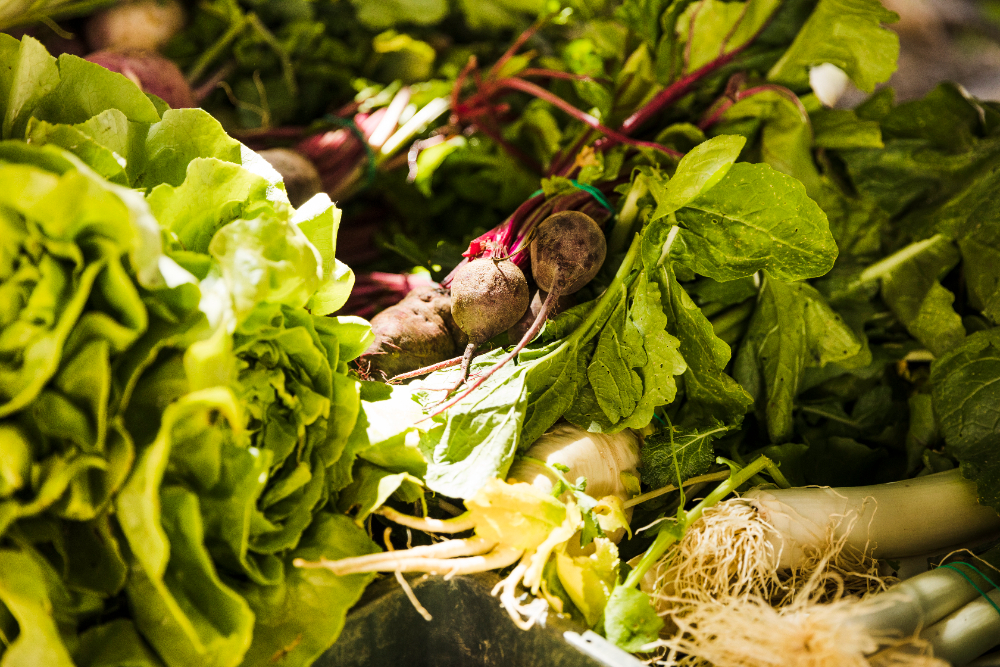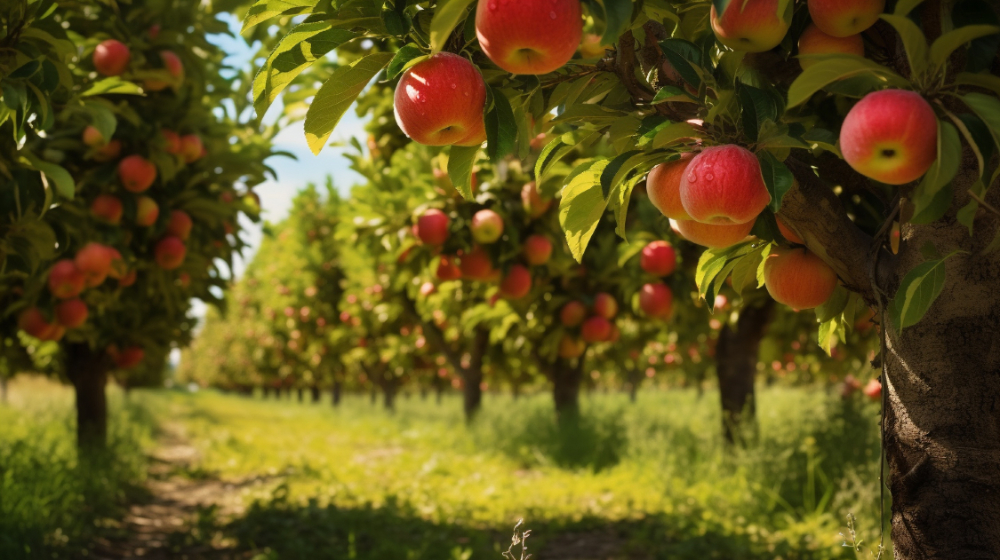Why Grow Organic Vegetables at Home?

Edible Gardening, Vegetables Why Grow Organic Vegetables at Home? Home gardening provides various benefits. Starting from the availability of pesticide-free fresh vegetables, it’s cost-effective and eco-friendly. The achievement from tending to the plants and when those plants are plucked as vegetables gives a high sense of fulfillment. Diverse climatic conditions in Pakistan provide an opportunity for growing both cool-season vegetables like spinach and carrots, and warm-season vegetables like tomatoes and cucumbers. How to Select the Right Vegetables: The selection of the right vegetables for your organic garden depends on the season and your region’s climate. Cool-season vegetables: Spinach, lettuce, radishes, cauliflower, and carrots thrive in winter. Warm-season vegetables: Tomatoes, cucumbers, okra, and eggplants are perfect for summer. Perennial options: Herbs like mint, coriander, and basil grow year-round and require minimal care. Selecting vegetables that are well-suited to your local weather will ensure better yields and less maintenance. Beginners can start with easy-to-grow options like spinach, chilies, or mint. Setting Up Your Organic Vegetable Garden: To create a productive organic vegetable garden, it is very important to start with proper planning and preparation. Begin by selecting a spot that receives 6–8 hours of sunlight daily. Vegetables like tomatoes and cucumbers thrive in sunny areas, while leafy greens such as spinach can tolerate partial shade.For soil preparation enrich it with organic matter such as compost or aged manure. This will improve its fertility and gives the plants crucial nutrients for their growth. If a home gardener is preparing pots, ensure that he has the containers with proper draining holes and then fill those with a mixture of garden soils and organic compost. Lastly, raised beds are awesome options for people who have enough space in their premises. Organic Gardening Ideas for Novice Container Gardening: Use pots or containers to grow vegetables like spinach, lettuce, and chilies. Vertical Gardening: Maximize limited space with wall planters or hanging pots for herbs and climbers like cucumbers. Composting: Create your own organic fertilizer using kitchen waste like vegetable peels, eggshells, and tea leaves. These methods are easy to implement and require minimal investment, making them perfect for anyone starting with organic gardening at home in Pakistan. Planting and Watering Your Vegetables: Planting varies from one vegetable to another. For example, seed direct sowing is used for root vegetables, such as radishes and carrots. Seedlings are better placed for tomatoes and eggplants. Make sure the spacing between them is enough so that the plants can grow without competing with each other for sunlight and nutrients. Watering is an essential part of taking care of your garden. Most vegetables need water constantly, but overwatering causes root rot. Therefore, it is advisable to water early in the morning, minimizing evaporation and helping plants absorb moisture. Natural Fertilizers and Pest Control To keep the soil healthy, use natural fertilizers such as compost, cow manure, or bone meal. These enrich the soil without introducing harmful chemicals. Homemade solutions like banana peel water or eggshell powder are also excellent for adding nutrients. For pest control, avoid chemical pesticides. Instead, opt for natural remedies: Neem oil spray: Effective against common pests like aphids and caterpillars. Garlic spray: Acts as a natural repellent for insects. Promote beneficial insects: Ladybugs and spiders will help control pest populations naturally. Regularly inspect your garden to catch infestations early and address them before they spread. Harvesting Your Organic Vegetables The best part of organic gardening is harvesting your homegrown produce. Knowing when to harvest is essential to enjoy the best flavor and nutrition. Leafy greens like spinach and lettuce can be picked as soon as the leaves are large enough to eat. Root vegetables such as carrots and radishes should be pulled out when they reach their mature size, while tomatoes and cucumbers should be picked when fully ripened. Use a sharp knife or scissors to avoid damaging the plants during harvesting. This ensures that your plants continue to produce throughout the season. Overcoming Common Challenges Gardening comes with its challenges, but they are manageable with the right approach. Extreme weather: Protect plants from excessive heat with shade nets or from frost with covers during winter. Pests and diseases: Stay vigilant and address issues with natural remedies like neem oil. Limited space: Use innovative techniques such as vertical gardening or hydroponics to maximize yield in small spaces. Even beginners can get over the hurdles with proper care and patience to be able to create a thriving organic garden. Conclusion Growing organic vegetables at home in Pakistan is more than just a hobby; it’s the way to adopt a healthier and more sustainable lifestyle. With some simple techniques and following the organic gardening ideas for beginners, you can enjoy fresh pesticide-free produce right from your garden. Start small, experiment with different vegetables, and watch your garden flourish over time. Whether you are growing spinach, tomatoes, or herbs, the benefits of home gardening will undoubtedly enrich your life. Tags : Growing Fruit Trees, Home Gardening Tips Share this :
Home Gardening Tips for Growing Fruit Trees

Edible Gardening, Fruits & Berries Home Gardening Tips for Growing Fruit Trees in Pakistan Pakistan’s varied climate and fertile soil make it a suitable place to cultivate various fruit trees. From the tropical mangoes of Sindh to the temperate apples of Balochistan, the benefits of fresh, home-grown fruits are reaped by gardening enthusiasts. Whether you have a large backyard or a small patch of land, growing fruit trees at home is an enriching experience. Here are a few practical tips to guide you in starting fruit gardening in Pakistan. 1. Choosing the Right Fruit Trees for Pakistan’s Climate The initial step to successful fruit gardening is to select the right trees suited to your region’s climate. Mango Trees in Pakistan: Mangoes are more adapted to hot and humid climates and perfect for Sindh and southern Punjab. Varieties like Sindhri and Chaunsa are popular choices for home gardens. Apple Trees in Pakistan’s Climate: Though difficult to cultivate in most parts of Pakistan, apple trees can still thrive in the cooler climates of Murree, Quetta, and Swat. Some varieties that work out well are Gala and Golden Delicious. Exotic Fruit Trees: For the adventurous gardener, there are guavas, lychees, and even dragon fruit. All these can be grown where winters are not extreme. Pro Tip: Consult local nurseries to find saplings best suited to your area’s microclimate. 2. How to Start a Fruit Orchard in Punjab, Pakistan Plan the Layout: Decide on the number of trees and their placement. Ensure enough space for the tree canopy and root growth. Test the Soil: Take a soil pH test to determine its fertility. Fruit trees generally prefer well-drained, loamy soil with a pH of 6-7. Plant Seasonal Varieties: Plant mangoes along with oranges or lemons so that there is fruit available all year round. Tip for Punjab Gardeners: During summer, water scarcity may be a problem. Use drip irrigation to water your plants properly. 3. Best Practices to Grow Mango Trees at Home Mango trees are a favorite for home gardens in Pakistan because of their excellent taste and easy care. Sun: Mango trees need to receive at least 6-8 hours of sun every day. Planting: A location with sufficient area where the tree can spread itself must be selected. Spring and monsoon seasons are perfect times to plant saplings for healthy growth. Care: Fertilize with organic compost, and prune the tree every year to remove dead branches. Protect young saplings from frost during winter. Mango trees not only provide you with delicious fruits but also decorate your garden. 4. Can You Grow Apple Trees in Pakistan’s Climate? Growing apples in Pakistan is region-specific. Areas like Swat, Gilgit, and Quetta have cool temperatures, so an apple tree can grow well in that area. Cold Requirement: Apples require a chilling period (number of cold hours below 7°C) to fruit thus, they are not adaptable for warm regions like Karachi or Hyderabad. Varieties to try: Early-harvest varieties like Anna or Dorset Golden should also be tried if you live in smaller areas with shorter winters. Planting an apple tree can become challenging, but the satisfaction of eating crispy and juicy apples makes it very worth it. 5. Tips for Growing Exotic Fruit Trees in Pakistan If you’re looking to make your garden stand out, exotic fruit trees like lychee, avocado, or dragon fruit can be an exciting addition. Avocado: Needs partial shade and plenty of water during the growing season. Suitable for areas with mild winters like Karachi or Lahore. Lychee: Prefers humid climates and thrives in areas like southern Punjab. Dragon Fruit: This succulent grows in arid conditions and uses little water after establishment. Growing exotics can take a little more time and more effort, but the fruits of your labor are so very worth it! 6. General Care Tips for Fruit Trees in Pakistan Make sure your fruit trees prosper with these basic care instructions: Watering: Deep but infrequent watering to encourage the growth of deep roots. Don’t waterlog. Fertilizing: Provide your trees with organic compost and potassium and phosphorus-rich fertilizers. Pest Control: Check your trees on a regular basis for typical pests such as aphids and caterpillars. Neem oil is a natural pesticide. Pruning: Trim overgrown branches to allow direct sunlight to reach all parts of your tree. 7. Benefits of Growing Fruit Trees at Home Benefits associated with growing your fruit trees: Fresh and Organic Produce: Relish pesticide-free fruits from your own garden. Cost Savings: The fresh fruit saves the grocery money. Eco-Friendly: Planting trees improves the air quality and supports local biodiversity. Conclusion Home gardening is more than just a hobby; it’s a way to connect with nature and enjoy the fruits of your labor—literally! Whether you’re planting mangoes, apples, or exotic varieties, the key lies in choosing the right tree for your climate and providing consistent care. So, roll up your sleeves, get your hands dirty, and start your journey toward a thriving fruit garden in Pakistan today. Tags : Growing Fruit Trees Share this :
